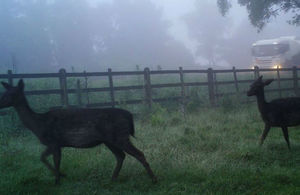More support for women experiencing the menopause
- The cost of repeatable HRT prescriptions will be cut
- Move set to save women who rely on HRT hundreds of pounds per year
- New government Menopause Taskforce to be co-chaired by Minister for Women’s Health, Maria Caulfield and Carolyn Harris MP
Women will benefit from cheaper and easier access to Hormone Replacement Therapy (HRT) to relieve symptoms of the menopause following commitments made in Parliament at the second reading of Carolyn Harris MPs’ Private Members’ Bill.
Working with NHS England, the government will look to implement longer prescribing cycles, in line with NICE guidelines, so women receive fewer prescriptions, reducing the need to pay frequent prescription charges. The government has asked NHS England to review current practice and the barriers to implementing NICE guidelines.
This could mean women would only have to pay one charge for up to a 12 month supply of HRT, saving up to £205 per year as a result.
To further improve access to HRT prescriptions, the government has also committed to look into combining two hormone treatments into one prescription, which affects approximately 10% of women accessing HRT.
Under current rules HRT is sometimes classed as two medicines if it contains both Oestrogen and Progesterone meaning women may be charged twice for one course of treatment.
Minister for Women’s Health, Maria Caulfield said:
We have heard loud and clear from women across the country and MPs that menopause support is a key issue we as a government need to do more to address.
As a woman and a nurse, I am acutely aware of how challenging the symptoms of the menopause can be to live with.
Cutting the cost of HRT – which can be a lifeline to women severely impacted by menopause – is a great stride forward, but there is more to do.
I look forward to further addressing the menopause as part of the Women’s Health Strategy and working with Carolyn on improving support for women across the UK.
Early analysis of the Women’s Health Strategy Call for Evidence, which received the biggest ever response to a Department for Health and Social Care consultation with over 110,000 individual responses earlier this year, shows access to HRT and wider menopause support are key concerns for older women. Menopause will form a central part of the first ever government-led Women’s Health Strategy, and will consider how to improve access to HRT including through education and training for clinicians on symptoms of the menopause and to ensure HRT is being prescribed to women who would benefit from it.
Alongside the development of the first ever Women’s Health Strategy for England, a new cross-government Menopause Taskforce will be established co-chaired by the Minister for Women’s Health and Carolyn Harris MP will be established. The task force will consider the role of education and training, workplace policies and peer groups for menopausal women can play in supporting women through what can be a mentally and physically challenging time.
Carolyn Harris MP said:
Today is a result for women across the country. The Bill was never about wins for either side of the political divide – it was about wins the 51% of the population who will directly experience the menopause.
The cost of HRT NHS prescriptions will be slashed – with the Government committing to working towards getting this down to a single prescription charge per year – and the new task force will look at all the other areas of support which are currently falling short and failing women.
I look forward to working with the Minister to revolutionise menopause support in this country and being world leaders in changing the narrative on something that has been a taboo subject for far too long.
To further support women going through the menopause the Civil Service is developing their first workplace menopause policy to ensure women can continue to work to their full potential.
This work is part of the ongoing government commitment to drive Women’s Health to the top of the agenda, ensuring the health and care system works for everyone, and enabling women to live healthy, happy lives.



